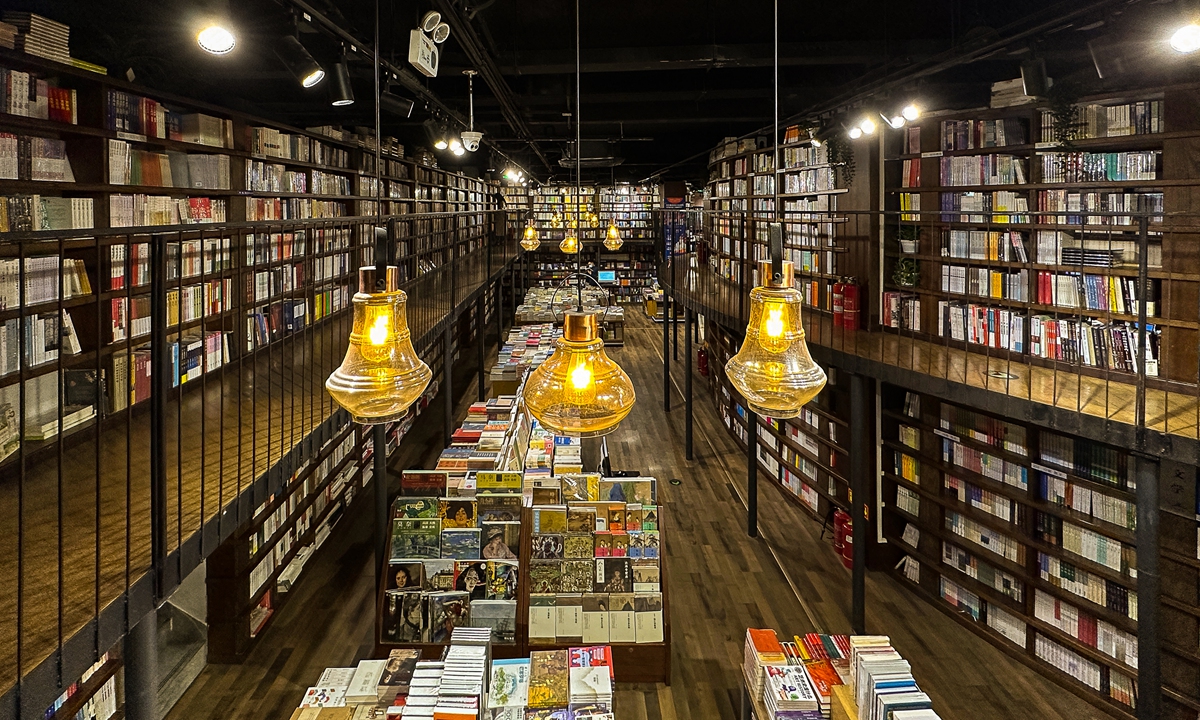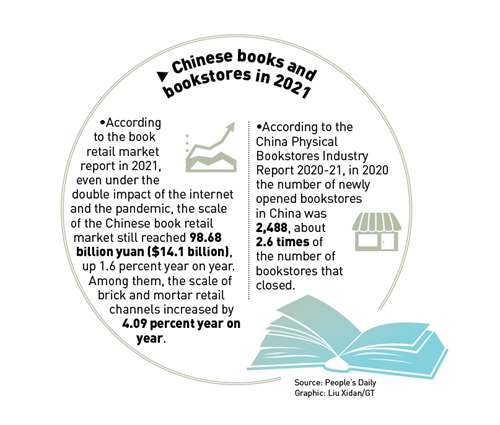ARTS / CULTURE & LEISURE
Creativity gives China’s bookstores a new lease on life
The next step

A bookstore in Sanlitun, Beijing Photo: VCG
In late November, the Beijing Municipal Government published a list of bookstores in the capital that will get subsidies from the government. The measure has received a warm welcome, providing a glimmer of hope to physical bookstore owners like Hong Xia."The local government has been very supportive since the outbreak of the pandemic," Hong told the Global Times.
As China's only independent archaeology bookstore, the Humanistic Archaeology Bookstore in Beijing was also on the list in 2021, a time when the pandemic put the squeeze on independent bookstores.
"The list was just revealed. We don't know the exact amount of the subsidy, but in 2021, they supplemented 60 percent of our rent and the reward for being a model bookstore was 100,000 yuan ($14,334)," she said.
Brick and mortar crisis
When COVID-19 forced non-essential businesses to close across the country in 2021, independent bookstores shuttered their doors and feared the worst.
Multiple media outlets reported that some ubiquitous private chain bookstores that are influential on the internet such as Zhongshuge from Shanghai, Eslite Bookstore from the island of Taiwan and Yanjiyou from Southwest China's Sichuan Province have closed many branches across the country.
According to the 2022 National Physical Bookstore Operations Survey issued by the Books and Periodicals Distribution Association of China, 54.53 percent of the surveyed 994 bookstores across China faced operational difficulties due to shrinking sales, rent and declining income.
Venerable bookstores began fading away - killed as they say - by the COVID-19 pandemic, but this opened the door for many independent bookstores, whose loyal fan bases wanted to be supportive.
Liu Jianran, a loyal fan of the Singaporean bookstore chain Page One in Beijing's most vibrant commercial hub Sanlitun, told the Global Times she often went to the book shop to show support during the pandemic.
"Every time I went there, I felt relieved to see that door open…" she said, noting that she could always find high-quality foreign language books and interesting cultural and creative products from some overseas designers at the book shop.

Evolving to survive
Government subsidies have indeed helped a lot of bookstores, but Hong said "we knew we'd need to become even more resilient and creative to stay afloat."
According to Hong, most customers of the Humanistic Archaeology Bookstore are students and staff studying history, archaeology, culture and museology as well as some die-hard history lovers. To offer them better service, the bookstore launched customized services.
"I help collect information and sort out the book list if they want books in a series or on a topic, and give them a discount if they want more books in bulk," said Hong.
Similarly, a hit Xinhua bookstore in Beijing's Haidian district that took "space dream" as a theme also managed to find creative ways to stay afloat.
Dong Hang, manager of the bookstore, told the Global Times that the store mainly provides cultural services that integrate reading, book sales, leisure, education and training for the vast number of aerospace science and technology workers and their families.
A prolonged period of closure not only shifts consumers toward buying books online, but also erodes the sense of community that bookstores have worked so hard to foster. To keep readers in this community, Dong said they have been constantly adjusting their operations in various ways, such as opening an aerospace special counter in the book shop, offering online services and group-buying channels.
"We have expanded the scope of our services such as providing door-to-door delivery services for readers in surrounding communities."
She pointed out that bookstores exert an irreplaceable influence in improving the cultural quality of surrounding communities.
Hong echoed this thinking, adding that the long-term existence of a well-run book shop in a community directly affects the reading habits of surrounding residents of all ages.
Besides Beijing, many book shops in other places in China are exploring new ways to stay open.
Librairie Avant-garde, which opened its first bookstore in Nanjing, East China's Jiangsu Province, has made the list of the most beautiful bookstores in the world several times over the years.
By incorporating local rural characteristics, the village branches of the Librairie Avant-garde bookstore chain have transformed into important platforms to display local history, culture and folk tradition that are even attracting many young migrant workers back to their hometowns.
"Each branch of the bookstore chain has its unique regional color, not only in book selection, cultural creative products and architectural style, but also the different management modes in accordance with different places. This has allowed the bookstore chain to become a pioneer and cope with survival challenges," Liu Yating, manager of the branch in Shaxi, Southwest China's Yunnan Province, a major hub for China's Bai ethnic group, told the Global Times.
In mid-November, the Beijing Municipal Government issued an opinion to promote the construction of a literary capital and to help bookstores attract readers due to their special location along the Beijing Central Axis, which is preparing to apply as a World Heritage Site.
"Only when a bookstore has clear positioning and creates its own brand can it truly attract readers, which is the next step for bookstores," said Hong.


